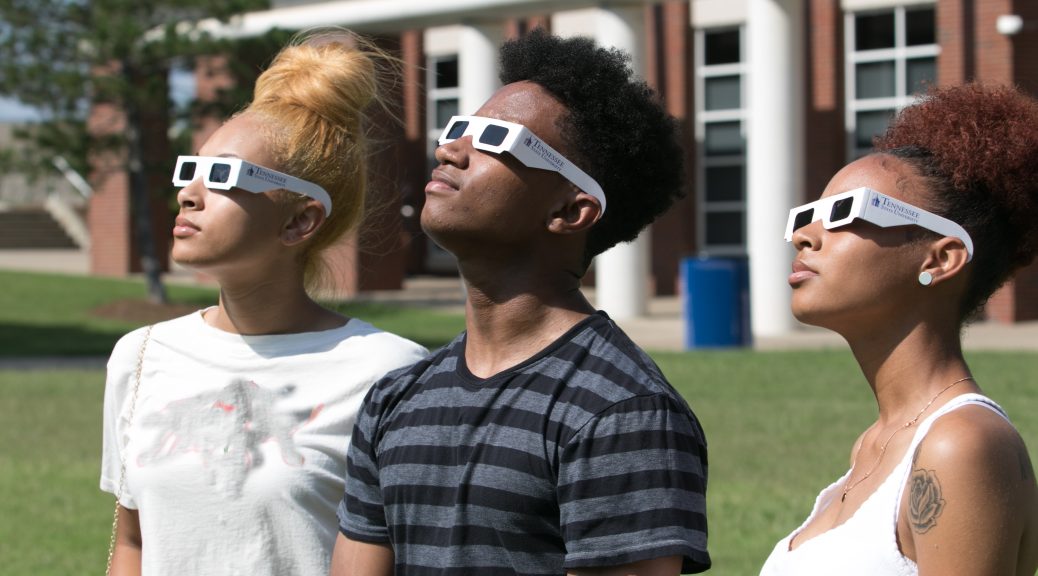NASHVILLE, Tenn. (TSU News Service) – The total solar eclipse on Aug. 21 could spur new interest in astronomy, said a Tennessee State University scientist.
Dr. Geoffrey Burks is an astronomer and associate professor of physics at TSU. He said the Aug. 21 event is once-in-a-lifetime, but its impact will probably be long lasting, particularly in the minds of youngsters.
“It’s just so rare to be able to see something in your lifetime where the sun is covered up in the middle of the day,” Burks said. “They’ll remember this a long time.”
TSU is having a “Blue and White Solar Eclipse Day Party” to recognize the historic day. Events are planned from 10 a.m. to 2 p.m. at Hale Stadium on TSU’s main campus, and at Avon Williams, the university’s downtown campus. The event at the stadium will include comments from TSU President Glenda Glover, NASA engineer Dr. Virginia Tickles, TSU researchers, as well as performances by TSU’s Aristocrat of Bands. There will also be free food.
Dr. Trinetia Respress, chair of TSU’s Department of Educational Leadership and one of the organizers of the events, said she believes Aug. 21 is a day students in particular will never forget.
“I think it’s something they will enjoy, whether you’re in science, or not in science,” she said.
During a solar eclipse, the moon passes between the sun and Earth and blocks all or part of the sun for up to about three hours, from beginning to end, as viewed from a given location.
Typically, there are two solar eclipses each year somewhere on the Earth, but most of the time the very narrow path of the total eclipse is a shadow over the ocean.
The one occurring on Aug. 21 is unique because it crosses the entire United States, and Nashville is the largest city within the entire eclipse’s path.
The last time a total solar eclipse could be seen from Nashville was July 29, 1478, according to NASA. After Aug. 21, the next one visible from Nashville will be on Aug. 16, 2566.
“This is a big thing,” said Willie Moore, a junior civil engineering major at TSU. “I want to make sure I am in the right place to see it.”
Burks said the Aug. 21 eclipse might also draw more attention to astronomy research. At TSU, its research and astronomy professors have received national recognition. The university owns and operates eight robotic telescopes at the Robotic Observatory Center in the mountains of southern Arizona.
In 1999, a team led by TSU astronomer Greg Henry announced the discovery of a shadow of a planet crossing a distant star. The discovery made national and international news, and was lauded by then President Bill Clinton.
“I want America to know about your enormous contributions to research,” Clinton said the following year at a higher education leadership banquet in Washington, D.C. “I want every American to know … Tennessee State astronomers made the world’s first direct detection of a planet orbiting another star.”
Last year, Dr. Henry was part of a team of astronomers who discovered an extrasolar planet scientists say has the most eccentric orbit ever seen.
Department of Media Relations
Tennessee State University
3500 John Merritt Boulevard
Nashville, Tennessee 37209
615.963.5331
About Tennessee State University
With more than 9,000 students, Tennessee State University is Nashville’s only public university, and is a comprehensive, urban, co-educational, land-grant university offering 38 bachelor’s degree programs, 25 master’s degree programs and seven doctoral degrees. TSU has earned a top 20 ranking for Historically Black Colleges and Universities according to U.S. News and World Report, and rated as one of the top universities in the country by Washington Monthly for social mobility, research and community service. Founded in 1912, Tennessee State University celebrated 100 years in Nashville during 2012. Visit the University online at tnstate.edu.
